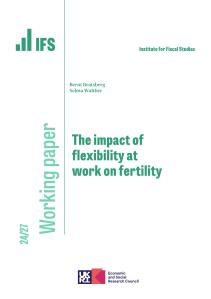
In this episode we discuss recent research on how the pandemic is impacting older workers.
Listen now: Apple Podcasts | Spotify | YouTube | Acast | Google Podcasts | Stitcher | RSS
Older workers are one group of people who are at risk of suffering serious and persistent consequences from the economic turmoil arising from the coronavirus pandemic.
Previous research has shown that unemployment shocks have persistent effects on the employment and incomes of older workers. In particular, older individuals who lose their jobs are less likely to secure re-employment, or to find a job on a similar wage to their previous earnings, than younger workers. Being unexpectedly out of work, or on lower wages, in the years leading up to retirement can have obvious negative implications for retirement resources.
In this episode, we speak with Rowena Crawford, IFS Associate Director, who has recently published research on how the pandemic is impacting older workers.
Host

Director
Paul has been the Director of the IFS since 2011. He is also currently visiting professor in the Department of Economics at University College London.
Participants

Rowena Crawford
Former Associate Director Institute for Fiscal Studies
Podcast details
- Publisher
- IFS
More from IFS
Understand this issue

Big firm, little firm: are differences between companies driving inequality and holding back growth?
30 August 2023

Disability, illness and pain are real problems for the entire economy
28 August 2023

How did parents’ experiences in the labour market shape children’s social and emotional development during the pandemic?
1 August 2023
Policy analysis

How do the last five years measure up on levelling up?
19 June 2024

How have the size and shape of the UK state changed?
9 June 2024

Size of the state has grown over this parliament and is likely to remain permanently bigger than pre-pandemic
9 June 2024
Academic research

The impact of labour demand shocks when occupational labour supplies are heterogeneous
28 June 2024

The impact of flexibility at work on fertility
11 June 2024

Income inequality in Ireland, 1987–2019
28 June 2024